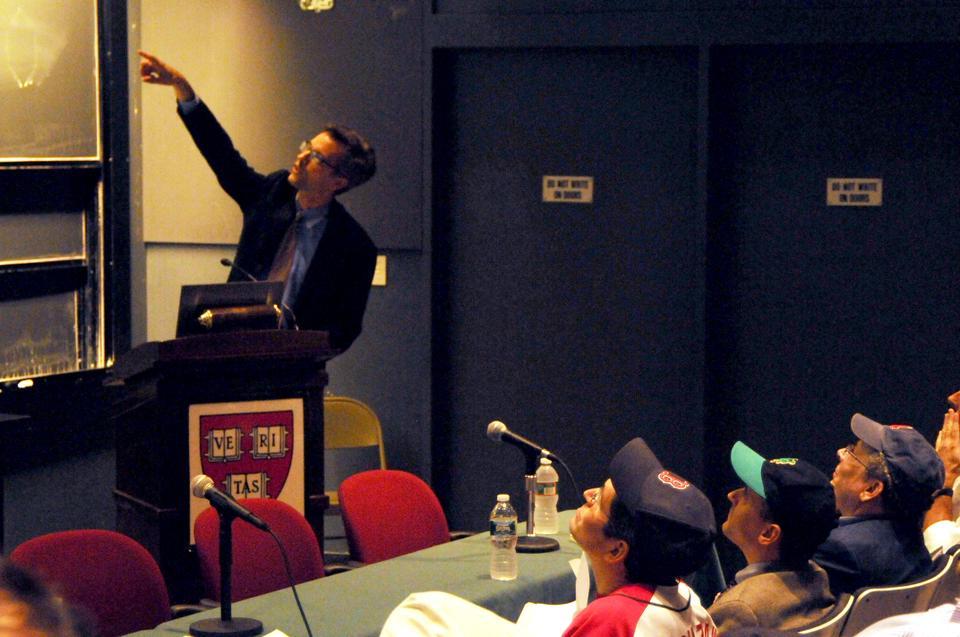
News
Summers Will Not Finish Semester of Teaching as Harvard Investigates Epstein Ties

News
Harvard College Students Report Favoring Divestment from Israel in HUA Survey

News
‘He Should Resign’: Harvard Undergrads Take Hard Line Against Summers Over Epstein Scandal

News
Harvard To Launch New Investigation Into Epstein’s Ties to Summers, Other University Affiliates

News
Harvard Students To Vote on Divestment From Israel in Inaugural HUA Election Survey
Professors Bat Around America's Pastime

Sporting various baseball caps, six Harvard professors showed off the lighter side of the General Education Program Tuesday night by presenting different academic aspects of baseball, from history to physics.
“Everything you need to know about life you can learn from either baseball or ‘The Godfather,’” said a smiling Dean of Undergraduate Education Jay M. Harris, opening the evening. In much the same way, all eight facets of the Gen Ed curriculum can be explored through baseball, Harris pointed out.
The presentation, “Gen Ed at Bat: A Discussion of America’s Favorite Pastime,” endeavoured to explore each of the eight categories.
Though an academic look at the sport, the evening maintained baseball’s friendly, competitive air. Stepping up to the podium, each professor was announced in true baseball fashion with “walk-up music” playing in the background and a statistical biography displayed on the projector screen.
History Professor Jill M. Lepore led off the night, offering a historian’s approach to the sport. Lepore posed the question ‘Who was the greatest shortstop of all time,’ and then defended her own choice, Honus Wagner, in historical terms.
“History is the act of making an argument by telling a story about dead people in which each part of that argument requires evidence,” said Lepore, demonstrating her point with baseball cards, photographs, letters, and statistics.
History of Art and Architecture Professor Robin E. Kelsey followed with a brief history of baseball cards and their relationship with photography and culture.
“Photography and particularly photographic portraits have historically been an agent of racial equality,” Kelsey said. “I think that egalitarian spirit carries over to the baseball card.”
Law School Professor Michael J. Klarman spoke about the relationship between race and baseball, focusing on the causes and impacts of desegregation on the game.
Following Klarman, History Professor Andrew D. Gordon spoke about the cultural exchange baseball engenders. Gordon authored a book published in Japanese about Japanese star Daisuke Matsuzaka’s difficult transition into Major League Baseball in the U.S.
Steven R. Levitsky, a government professor, followed Gordon and spoke about baseball as a cultural and political force in Latin America.
Physics Professor John E. Huth closed the night with the physics of pitching. Huth alternated complex equations with baseball animations and short demonstrations to describe, among other things, the confounding nature of a knuckleball.
A fairly small but spirited audience actively participated and challenged the presenters’ assumptions about the game.
“I thought they were going to take the fun out of baseball, but it was actually a lot of fun to look at the sport academically,” said Mark Paskowsky, who attended the presentation with his wife Laurie B. Forcier, senior academic projects manager at the Graduate School of Education.
Want to keep up with breaking news? Subscribe to our email newsletter.
